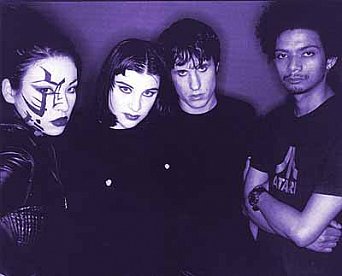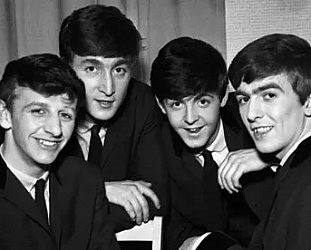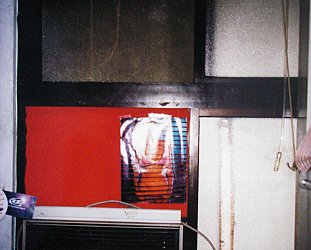Graham Reid | | 4 min read

These self-avowed anarchists whose industrial strength implosion of punk, thrash, samples and air-punching sloganeering makes for an explosive noise, are on the barricades - or at least standing on the stage monitors - haranguing capitalism and its evil works.
The revolution may not be televised - but it already has its sonically uncompromising soundtrack thanks to this four piece who combine traditional rock couture and accessories (black leather and eyeliner) with a political agenda.
At one level there's something ludicrously cartoonish about ATR's headline-grabbing lyrics and empty lyrical gestures. Their new album 60 Second Wipe Out is crammed with calls for "revolution action" and asserts "we won't keep quiet." Like the old Gang of Four however, they sometimes nail a target dead centre (Your Uniform [Does Not Impress Me]) and you cannot deny the conjunction of energy they call on.
But look at interviews and they are treated like any other pop stars: they may have a political agenda, but don't count on NME to tell you what it is. They were too busy being impressed by the fact frontman Alec Empire once slashed his arm in a suicide bid. This is taken as a mark of how serious he is about his politics, not that he was - as he admits - simply depressed.
Empire however is smarter than the simple-minded non-specific sloganeering on their albums and in pop mag profiles. He concedes the band and albums are the jumping-in point for those who would understand a complex political agenda.
"The band is to attract attention. Like advertising for a political world view, that's really all you can do with music. Artists can only vision things and maybe to live the vision. What is important is you feel this [music] on an emotional level.
"As soon as people get the energy and information they realise that [Western] society is a fake living off the back of the Third World. It might seem nice, but it's like a tranquilliser."
If ATR is simply the call-up, then information about the manifesto comes through a Website (www.digitalhardcore.com) and their 80-page Digital Hardcore magazine of which they print 50,000 copies.
"I see ATR as one element out of many. We had to make certain things visible to get information across to change things. In the end it's about uniting people for these ideas. I think you can't understand everything in three seconds, but you also don't have to be, like, 50 and read, like, 80 books to get this."
He also recognises "these emotions [we explore] could be manipulated into any direction so that background information has to follow."
Pushed to articulate his vision of a anarchist society he says its one "without power structures, it's non-capitalist."
"It's always the structure of society and not really people in a certain political party or company who do these bad things, it's the structure."
Given the social and intellectual failure of Marxism, the collapse of socialist states and rise of ethnic conflict, ATR would seem to have their work cut out facing down capitalism and the new internationalism. But the financial scandals of the past week in their homeland and Helmut Kohl's resignation have given them more ammunition and come as vindication.
"We were totally right about that and more and more people come up and say, 'We thought you had weird conspiracy theories but it was really like that!' They are totally shocked."
But for those who caught the anarchist revolution back when punk ruled the world, here's a question.
In these pages last week former Clash-man Joe Strummer asked our interviewer Russell Baillie to imagine he were writing about Joe to an Offspring fan.
Here's the flip, Alec: how would you describe Atari Teenage Riot to a former Clash fan, a former punk, maybe even anarchist, who is close to 40 these days?
"Basically this band is about combining all the confrontational and revolutionary elements of music of the last century. We are making a combination to recreate, and possibly create, a bigger energy.
"You'll find elements of punk rock in there and with sampling technology it's possible to go back to those recordings and capture in a digital way this revolutionary spirit. We are combining these to create this revolutionary energy. That's the idea of the band."





post a comment